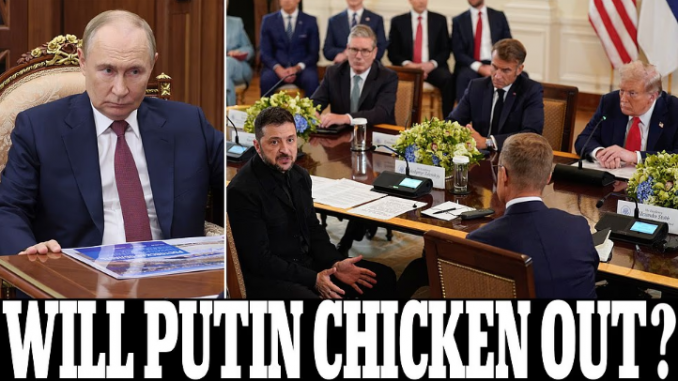
Vladimir Putin has failed to commit to peace talks with President Zelensky fuelling fears he will pull out of efforts to end the Ukraine war at the last minute. It comes as the Kremlin branded a 40-minute phone call between President Trump and Putin on Monday as ‘frank’ and only ‘fairly constructive’. Putin’s aide Yuri Ushakov made the comments as he confirmed the pair had explored ‘raising the level of representatives of Moscow and Kyiv at the talks’.
| Published August 19, 2025
Moscow Remains Reluctant on Peace Talks as Ukraine Seeks Direct Negotiations
Moscow has signaled it will not commit to high-level peace talks with Ukraine, including proposals for a summit between President Vladimir Putin and President Volodymyr Zelenskyy. Despite repeated international efforts, Russia continues to maintain its position, complicating attempts to reach a negotiated settlement.
The conflict has seen renewed military activity, with attacks occurring around key diplomatic moments, a move Ukraine describes as disruptive to the negotiation process. Kyiv continues to push for direct talks with Moscow and security guarantees modeled on international alliances, emphasizing that any agreement must respect Ukraine’s territorial integrity.
International actors, including the United States and European nations, have remained engaged, focusing on support for Ukraine and exploring avenues to facilitate dialogue. While some diplomatic progress has been achieved in areas such as prisoner exchanges, a comprehensive peace deal remains elusive.
Analysts note that the current stalemate underscores the challenges of negotiating amid ongoing hostilities and differing strategic goals. Both sides face pressure to find a path forward, but the timing and terms of negotiations continue to be a central obstacle.

President Zelensky shakes hands with President Trump during talks on Monday

Vladimir Putin has failed to commit to peace talks with fears growing he will drop out at the last minute

Trump, Zelensky and European leaders meet at the Oval Office on Monday
 Implications
Implications
1. Moscow’s Refusal Highlights Weakness of U.S. Diplomacy Alone
-
Right-leaning analysts often argue that U.S. diplomacy without strong leverage or credible military deterrence fails to produce results.
-
Russia’s refusal to commit to peace talks—even amid international pressure—reinforces the idea that strength and deterrence, rather than negotiation alone, are the key to containing aggressive states.
-
This can be interpreted as a caution against “soft” or overly conciliatory foreign policies.
2. The Importance of a Strong U.S. President
-
Trump’s involvement is a frequent talking point in right-leaning circles. The article and related coverage emphasize that high-level engagement from a strong, authoritative leader is necessary to bring Russia to the table.
-
From a conservative lens, Zelenskyy seeking security guarantees from Trump (instead of relying solely on multilateral institutions like NATO or the UN) validates the idea that direct leadership and bold diplomacy are essential for peace.
3. Skepticism Toward European Reliance
-
Right-leaning perspectives often stress that Europe lacks the political and military backbone to handle threats alone.
-
Russia’s continued aggression and refusal to negotiate underscore European dependence on U.S. military and political support, reinforcing a conservative argument for maintaining a strong U.S. defense posture and prioritizing American interests.
4. Putin’s Strategic Posturing
-
The timing of Russian attacks—just before diplomatic meetings—can be interpreted as proof that Russia exploits Western restraint and moral posturing.
-
This aligns with conservative arguments that appeasement or waiting for “good faith” in authoritarian regimes is ineffective. Strong deterrence and readiness to respond are preferred.
5. National Security Over Global Idealism
-
From a right-leaning view, the situation validates prioritizing national security guarantees over ideological peace frameworks.
-
Zelenskyy’s demand for a NATO-style security guarantee without territorial concessions resonates with the conservative principle of protecting sovereign borders and deterring aggression first.
 Overall Takeaway:
Overall Takeaway:
Moscow’s refusal to commit to high-level peace talks with Ukraine highlights the ongoing challenges in resolving the conflict. Despite international pressure and repeated diplomatic efforts, Russia has maintained its position while Ukraine continues to seek direct negotiations and security guarantees.
The timing of recent Russian attacks, coinciding with planned diplomatic meetings, has further complicated prospects for dialogue. International actors, including the U.S. and European nations, remain involved, focusing on providing support to Ukraine and exploring potential pathways for negotiation.
The situation illustrates the complexity of achieving a negotiated settlement, showing that progress depends on both sides’ willingness to engage and the ability of mediators to facilitate constructive discussions.
SOURCES: DAILYMAIL ONLINE – Moscow REFUSES to commit to Putin-Zelensky peace talks, saying 40-minute call with Trump was only ‘fairly constructive’ – as Finland’s PM questions if ‘untrustworthy’ Kremlin despot has ‘courage’ needed to act following US-led bid to end Ukraine war





Be the first to comment